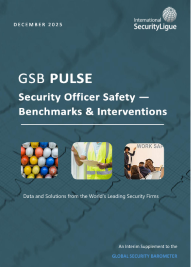
July 24 is International Security Officers' Day, an important moment to honor the millions of professionals who make society safer by protecting hospitals, businesses, schools, public transportation, critical infrastructure, and more. But this year, in addition to saying thank you, there is a critical need to confront a troubling question: Why, given the essential nature of their work, are so many security professionals around the world barely scraping by?
A primary cause is that governments that claim to care about safety and regulation are often undermining it themselves—by awarding public contracts for security services based on cost alone.
“Across the globe, governments award billions in security contracts—yet many still choose providers based solely on the lowest price,” explains Stefan Huber, Director General of the Ligue.
It’s a race to the bottom that ignores the very standards that regulators are supposed to enforce: fair wages, training, compliance, and quality of service. — Stefan Huber
The result is a fragmented, uneven marketplace where compliant companies are penalized, and underpaid officers suffer the consequences.
New Infographic Tells the Story
The damage caused by a price-focused system is highlighted in the Ligue’s new “Meet Mateo(s)” and “Meet Maria(s)” infographics, which are being distributed across social media and to news organizations around the world.
The tongue-in-cheek graphics make a serious point about the negative cascading effects of a world in which security is treated as a commodity and quality is an afterthought. When public agencies focus on low bids when contracting for security services, consequences include:
- Penalizing companies that are compliant with wage laws and other regulations;
- Depressing industry wages and contributing to absenteeism, turnover, and mental health strain among workers;
- Complicating worker recruitment, resulting in staffing shortages and significant risks for public safety.
The graphic compares this short-sighted approach to the many benefits from a quality-driven procurement process for security services, which goes beyond ensuring a living wage for individual workers to include:
- Closing pay gaps and supporting gender and racial equity;
- Enticing skilled workers to the industry and raising the quality of the global security workforce; and
- Improving workforce stability and work performance.

Global Effort to Transform Security Contracting
The latest campaign is part of an on-going effort to increase focus on quality in security contracts. In 2024, the Ligue conducted a comparative data analysis of public agency tenders, which revealed that good procurement practices are followed less often in contracts for security services than in contracts for other—arguably less consequential—services, including library services, pest control, and filing services.
In the coming months, the International Security Ligue, together with Open Contracting Partnership and the National Association of Security Companies (NASCO), will be unveiling results from a global data mining project to expose the scale and cost of flawed public tendering—and provide practical pathways to reform. It reveals a widespread pattern of public tenders that ignore standards, skirt wage laws, and reward non-compliant bidders.






